- Home
- Barry Lyga
Bang Page 2
Bang Read online
Page 2
Coming around and around again. And the water disgorges the same sights, same house, same me, same Mom.
My Mom
My mom is forty-one years old. She does not necessarily look older than that, but the fact is that forty-one is usually people’s second or third guess after two higher numbers. Not substantially higher—they guess forty-three, maybe, then wince at the flicker in her eyes that says too high and drop to forty-one.
When people get older, they develop fine crenellations around their eyes, typically called crow’s feet or, more popularly, smile lines.
In my mother’s case, I don’t believe they were caused by smiling.
She conceals her sadness as well as could be expected, ten years later. She laughs at silly sitcoms and she grins at funny comments her friends leave on Facebook, but there is always a veil between her mirth and the world, a sheer scrim that mutes her reaction. It is as though she is a half second behind the world and can never catch up. And has given up trying.
I try to stay out of her way. This is just something I do. I avoid her. I began doing this early on. Some of my earliest memories. Six or seven years old and I was trying not to spend time around my own mother.
I don’t want her to see me too often, to encounter me, to deal with me. Me, this walking, talking, living, breathing, eating, shitting, farting reminder of what she’s had and what she’s lost. During the school year, it’s easy—I’m out the door after she leaves for work and most days I’ve eaten dinner and ensconced myself in my bedroom by the time she’s home.
Summer, it’s harder. With no ready-made excuse for being absent, I look for ways to get out. I don’t linger in the house. I sleep in late, stay out late, keep my bedroom door closed when I’m home.
I make myself invisible, intangible.
It’s easier for her, easier for me, just easier, period.
According to Dr. Kennedy, my mother is the surviving member of the family dealing with my sister’s death the best. Let that tell you something.
There are ingredients in the refrigerator for pizza. This is Mom’s unspoken, unspeaking way of telling me that I should make pizza for dinner. I typically make something for myself before she comes home, but some days she requests homemade pizza. It’s what we have that passes for tradition.
I assembled my first homemade pizza three years ago, when I was eleven. In a mandatory home ec class in middle school, we made French bread pizzas, twenty-one eleven-and twelve-year-olds slopping sauce onto bread, sprinkling plasticky shredded mozzarella over it, then shoving the whole dripping mess into the school’s ovens.
Somehow, this fascinated me. The too-browned, soggy results of the culinary experiment resembled actual pizza closely enough that I was captivated, stunned that something hitherto conjured only from a cardboard delivery box could be brought into existence with my own two hands. It was all I talked about for days, until Mom finally bowed to my insistence and allowed me to make pizza for lunch one Saturday.
The results were less impressive than in home ec, as impossible as that seemed, and Mom declared that we would henceforth “do this right.” She downloaded a guide to making homemade pizza, and my obsession was born. I wanted to go back to the beginning, to the raw ingredients. I learned how to use the big stand mixer and make my own dough. I sliced the slightly gelatinous bulbs of mozzarella. While at first I used store-bought sauce, I eventually unearthed a good and not-too-difficult recipe online and began making my own. I wanted to smoke my own meats for sausage and pepperoni, but Mom drew the line there.
From the ingredients she’s assembled, tonight looks like pesto and chicken pizza, one of my favorites. The dough ball is already thawed in the fridge; I like the sensation of kneading it, its elasticity, its pliability. I flour the counter and roll out a crust measuring about fourteen inches across. Just enough for two people. I crimp the edges with my fingers.
I slice mozzarella into discs. Shredding it gives a more even coverage, but I like the look of the slices after they’ve melted. I chop the chicken and scrounge in the fridge for the remains of an onion. Mom always forgets the onion. “You can just use onion powder,” she likes to say, but it’s not the same. Not at all.
I sauté the chicken and onion together in some olive oil, toss in some fresh grated pepper, and preheat the oven as high as it can go.
The pesto—not homemade, I regret; Mom still hasn’t bought a food processor—gets spooned onto the crust first. A little goes a long way. I want just a glistening sheen of green and black, not a sludge. Then I add the slices of mozzarella, aiming for maximum coverage without any sort of noticeable pattern.
The chicken and onions go on last. Almost last. After they’re distributed across the pie, something looks off, so I grate some parmesan and sprinkle it over the whole thing.
That works.
I crank out my homework while the oven finishes preheating. There’s little to do this late in the year, so it doesn’t take long.
My culinary pride and joy—a pizza stone Mom bought me for Christmas last year—rests hot and ready on the center rack of the oven. First I sprinkle it with a little cornmeal (to keep the crust from sticking) and then, with a pizza peel, I transfer my creation to the stone.
The pizza’s done by the time Mom walks in the door ten minutes later, the cheese bubbling and perfectly pocked with brown, the crust tanned and only the slightest bit yielding.
“Your timing is impeccable,” Mom says, pecking me on the forehead. I wait until she turns around to put her purse down before rubbing the kiss-spot on my forehead with the palm of my hand.
“It needs a couple of minutes to cool,” I remind her as I paddle the pizza out of the oven and set it on the counter. “Otherwise the cheese will go all over the place when I cut it.”
“Well, I’ll go wash up and get out of these shoes.”
A few minutes later, we’re at the table, eating in silence. I would rather be watching TV. Or eating alone.
But I just eat. Because there are things we do.
“This is really good,” Mom says, and I grunt, “Uh-huh,” because if I say nothing, she gets angry, and I don’t like to make her angry. Not because of anything she does or says when she’s angry, but just because making her angry makes me sad. She doesn’t deserve it.
“It really hits the spot,” she goes on.
“Uh-huh.”
There’s a familiar tone in her voice. It’s the I have something to say, but I don’t want to just jump right into it, so I’ll do chit-chat first tone. I know it well.
“Sebastian, could you at least look at me when I talk to you?”
With a slow, infinite effort, I lift my gaze to her. She smiles that gauzy smile.
“Was that so difficult?”
“Compared to what?”
The smile widens almost imperceptibly. “I think we should talk.”
“Isn’t that what we’re doing right now? Have I been misled my whole life?”
“I’m thinking we should talk about what you’re going to do this summer.”
A shrug. “I’ll get by.”
“No. I don’t want you lazing around like last summer.”
“Last summer was pretty great. I didn’t laze. I was hanging out with Evan.”
“And what did you two accomplish?”
Touché.
“You’re fourteen now. Old enough to get a summer job.” Before I can protest too vociferously, she forestalls me with a raised palm. “Or do something productive. It doesn’t have to be a job. Just something worthwhile.”
“Evan isn’t getting a job.” Evan will be headed to something called Young Leaders Camp, a hellish mix of Model UN and overnight camp, spliced with the DNA of a tech start-up incubator. It’s what rich kids do with their idle time as they await their Ivy League acceptance letters and keys to the Congressional washroom.
This is an argument I know is doomed to immediate failure, and—truth be told—I only offer it halfheartedly.
Mom doesn�
��t disappoint. The words rich, family, and not the same are employed rather effectively in a mix of others.
“I want you to know how proud I am of you,” Mom says slowly, so slowly that I almost believe her. “You take care of yourself. You aren’t mixed up in anything crazy. I don’t have to worry about you.”
Anymore, I add silently.
“But you’re in high school and you’re going to be a sophomore. You’re going to graduate sooner than you think. And I’m not saying that you need to figure your life out right here, right now, or even this summer, but, Sebastian… honey, you need to start at least thinking about it.”
I shrug. A shrug is, by definition, a noncommittal action, but I do my best to add further noncommitment to it. I don’t want to think about or start thinking about figuring out my life, for whatever it’s worth.
“You can’t drift your whole life. You can’t give up on your future because of what happened—”
And almost without realizing, I’m telling her to shut up.
And she won’t, so I’m telling her to seriously shut up, to shut her big fat stinking mouth, and she’s a blur through my tears and I can’t hear her voice through my own yelling—
—I don’t know when I started yelling—
—as I’m up from the table—
—running—
—bathroom—
—just in time—
—tears and snot and then leaning over the toilet, vomiting chicken and pesto and mozz and parm and the crust, all of it gone, a green-gray sludge floating there as I spit the last bits into the water, crouched down, clinging to the tank and the rim of the bowl as though I could fall in and drown.
I flush.
I rinse my mouth with lukewarm water cupped in my hands. I spit out grit that tastes of garlic and basil.
Wipe my eyes. My mouth. Blow my nose.
Mom loiters in the hallway, waiting for me as I emerge. A glut of emotions roils inside me. I’m ashamed of yelling at her, of running away, of throwing up. I’m furious at her for bringing up the past. I’m outraged. I’m exhausted.
On those rare occasions that I dredge up our shared history, she suddenly comes down with a migraine. Or a stomachache. Anything to avoid the topic.
“You can’t do this to me,” I tell her. “When I try to talk about it, you decide it’s not time. But then you go and spring it on me. It’s not fair.”
“This isn’t over,” she says quietly. “By the weekend, I want you to be able to sit down and tell me your plans for the summer.”
I tell her to fuck off.
I tell her I can’t think straight.
I tell her to go to hell.
I tell her I’ll do it.
I tell her I can’t do it.
I tell her it’s pointless.
I tell her none of those things. Because I can’t believe she’s still fixated on me having a “productive” summer. If I’d had an aneurysm instead, if I’d had a heart attack, if I’d collapsed twitching into an epileptic fit, then would she understand how desperately I do not intend to have this conversation? Or would she run alongside my stretcher as it’s borne into an ambulance, lecturing me on the importance of my future?
But that’s all pointless speculation. Because this summer will be my last. And that, most likely, is why I really reacted the way I did. Because it’s true and it’s coming and it’s happening, and she’s acting like this is just any other summer.
Not that she knows. Not that I can tell her.
“I’m going to ride my bike,” I tell her.
“Be back before ten,” she says. “It’s a school night,” she adds needlessly, as though I can’t tell on my own.
I say nothing. Outside, the sun is setting, the air still humid. Muggier than usual, the day’s heat releasing last night’s rain from the soil into the air.
I take off from the back of the house, cutting through the Marchettis’ backyard too fast for Mr. Marchetti to notice it’s me and yell from his window.
On an adrenaline high, I lose control of my bike in the dark. A patch of slick grass over mud. The next thing I know, I’ve wiped out for the first time since I was six, my bike slipping out from under me and dumping me onto the wet ground.
“Are you okay?” A girl’s voice.
I was okay, until I realized my private humiliation was actually a public exhibition. The voice comes from the back porch of a house. Not just any house, though—it’s the house where I watched the mover arguing with the new owner.
A dark shape moves, backlit by the porch light. I hold up a hand to eclipse the glare. “I’m fine.”
“Are you sure?” she asks.
“Yeah.” I lever myself off the ground, then I realize I’ve planted one hand on the muddy spot for support. With a sigh, I flap the hand, shaking off the mud. I’ll have to wipe it on my pants.
“Don’t do that,” she says suddenly, reading my mind. Or, more likely, my body language. There’s a clatter of feet on steps, and then she’s right there, right in front of me, holding out a handkerchief, and I try not to stare at the scarf wound around her head. It’s not that I’ve never seen this before. I’ve just never seen it live, in person. Especially here, in Brookdale, the place crowned three years ago as the “Whitest Town in Maryland.”
“Want a picture?” she asks. Not testily, to her credit and to my shame.
“I’m sorry.” I take the handkerchief and focus mightily on the complex task of wiping my hands clean. When I look up to return her handkerchief, I can’t help but stare at her, all light brown skin and quirked lips and arched eyebrows.
“I’m Sebastian.” I hold out a now-clean hand in what suddenly feels like a retrograde and archaic gesture.
The hand hangs there in the air for a too-long moment. She considers it, hesitates. I withdraw my hand, which now burns as though it’s been caught at something.
“I’m sorry,” I blurt out immediately. “Really sorry.”
She laughs and the tension evaporates, just like that. “You’re apologizing for what I did? Do you always do that?”
“I don’t know.” And I don’t. But I don’t care. I don’t care about anything. I can’t believe that I’m standing here, talking to her. Her face is almost perfectly round, utterly smooth, bordered by the scarf such that there’s nothing to distract from those eyes, from her. No ears, no hair, no earrings or neck. Just that face and that gaze. She could have asked me if I always climb the waterspout to the rooftop during a full moon, and I would have said, “I don’t know.”
It’s not that I’m smitten. Or in love. I am, rather, stunned. Last year in Advanced English Lit, we read part of an old, old poem called Paradise Lost. In it, the word astonied was used, which apparently is similar to astounded, but it has to do with turning to stone from shock. Metaphorically. And right now, I am astonied.
Wait. How long has it been since I said anything? What’s wrong with me?
“I’m Sebastian.” I tell her, not offering my hand.
“You said. I’m Aneesa.”
“Aneesa.”
“Yep.”
I say it one more time, tasting it before letting it spill out of my mouth. “What does it mean?” I ask, and immediately feel like a jackass, because isn’t that what people always say to people with foreign-sounding names? Ugh.
She stares, irritation and insouciance dancing together in those blacker-than-black eyes. “I’ll tell you,” she says, not unkindly, “if you can tell me what your name means.”
“It’s… it’s just a name.” I hand back the handkerchief. We don’t actually touch, but for a moment we’re both touching the cloth. This conversation is officially off to a screeching halt. I let go of the handkerchief, and my hand suddenly feels lonely.
“Thanks for the handkerchief,” I say as lamely as humanly possible. “Good luck moving in.”
“‘Good luck moving in’? Is the house haunted? Is the neighborhood watch coming after us?”
“I saw your dad arguing wit
h the mover, is all.”
“Oh. Right.” She shrugs. “They left something like three boxes at the old house. And they were like, ‘It’s our policy that another truck will redeliver in two days.’ And Dad said, ‘It’s not Timbuktu—it’s Baltimore. It’s literally less than an hour away. Just go get them.’”
“So what happened?” I don’t know why I care. This is the most boring anecdote I could ever imagine. Yet I’m captivated for some reason. Astonied.
“Dad got on the phone with the people at the office and sounded all confused and said something like, ‘Am I really supposed to tip these guys for not getting the job done?’ And the guy with the truck was suddenly like, ‘We’ll go get those boxes.’ And they did.” At the end of her tale, she smiles dimples into her cheeks and spreads her hands as though she’s just performed a magic trick. Even though it’s just a Story About Some Boxes, I can’t help it—I grin back at her, as though we’ve just conquered high-level algebra together.
“I’m glad that turned out well for you.”
She shrugs again. “It was three boxes of kitchen stuff. No big.”
In the ensuing silence, I realize I’m staring at her and that she is, of course, intensely aware of this. I could stare even longer, but it could become more uncomfortable than it already is, if that’s even possible. I stoop for my bike, right it, and throw a leg over. “Well, I guess I’ll see you at school. Or on the bus. You’re in high school, right?”
“Yeah. But I finished freshman year at my old school, so I won’t start up again until fall.”
“Lucky you.”
And I ride off.
I actually ride off on that.
Lucky you.
I am genuinely stupid.
By the time I’ve coasted down the hill off of Route 27 and stashed my bike among the trees, I’ve forgotten all about Aneesa and her kitchen boxes, her sly dad, her dimples, and my Lucky you.

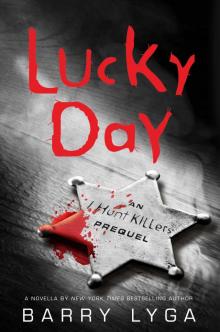 Lucky Day
Lucky Day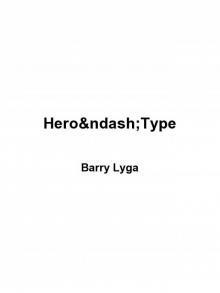 Hero-Type
Hero-Type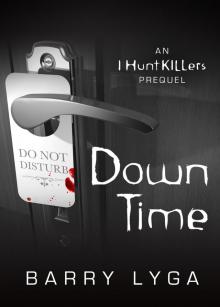 Down Time
Down Time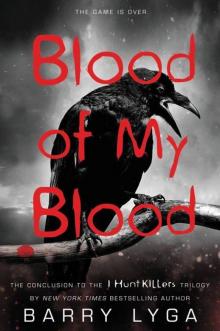 Blood of My Blood
Blood of My Blood Goth Girl Rising
Goth Girl Rising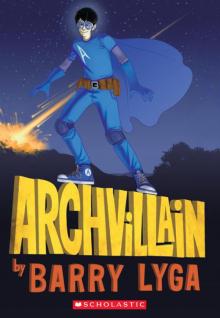 Archvillain
Archvillain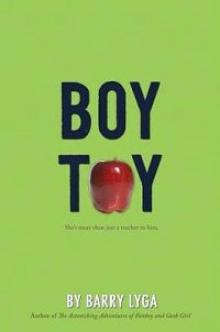 Boy Toy
Boy Toy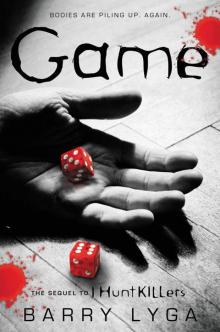 Game
Game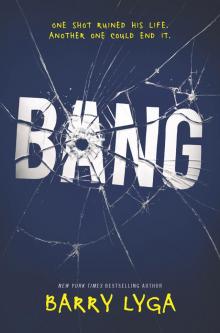 Bang
Bang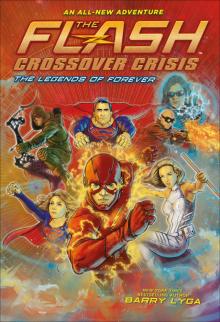 The Legends of Forever
The Legends of Forever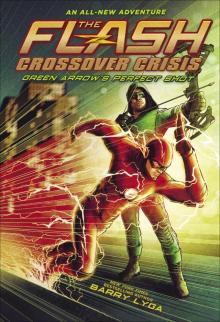 The Flash: Green Arrow's Perfect Shot
The Flash: Green Arrow's Perfect Shot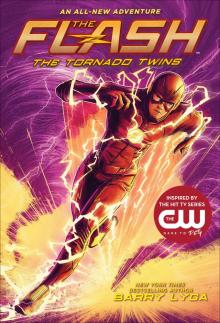 The Flash: The Tornado Twins
The Flash: The Tornado Twins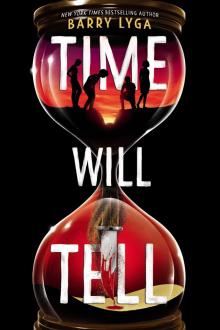 Time Will Tell
Time Will Tell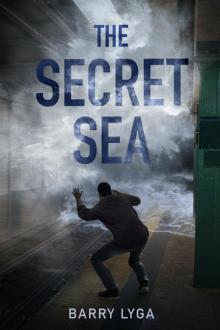 The Secret Sea
The Secret Sea The Hive
The Hive Career Day
Career Day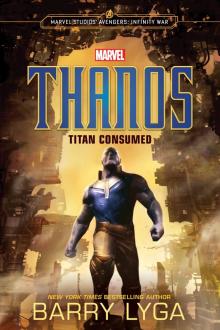 MARVEL's Avengers: Infinity War: Thanos
MARVEL's Avengers: Infinity War: Thanos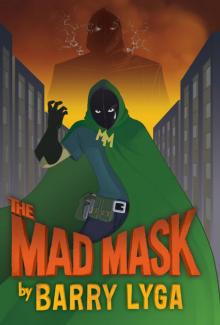 The Mad Mask
The Mad Mask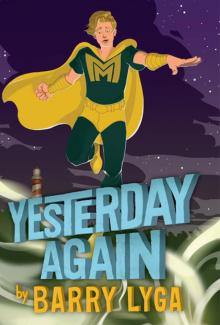 Yesterday Again
Yesterday Again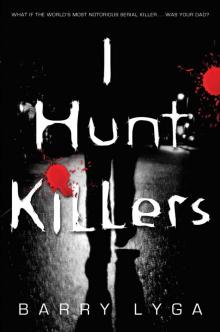 I Hunt Killers
I Hunt Killers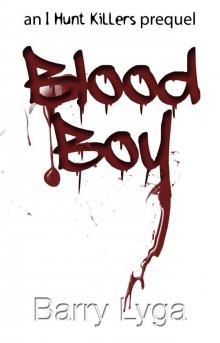 Blood Boy
Blood Boy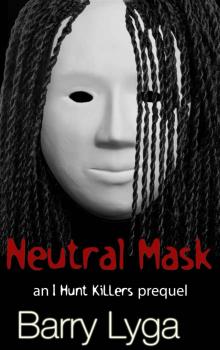 Neutral Mask
Neutral Mask The Astonishing Adventures of Fanboy and Goth Girl
The Astonishing Adventures of Fanboy and Goth Girl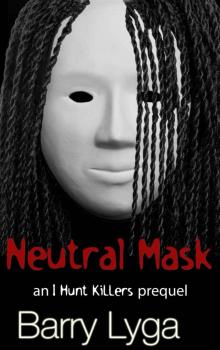 I Hunt Killers Neutral Mask
I Hunt Killers Neutral Mask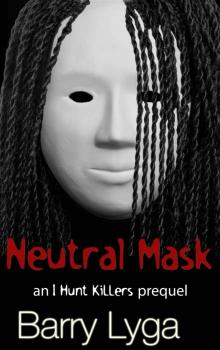 Neutral Mask: an I Hunt Killers prequel
Neutral Mask: an I Hunt Killers prequel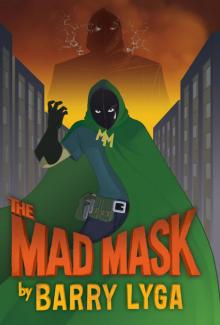 Mad Mask
Mad Mask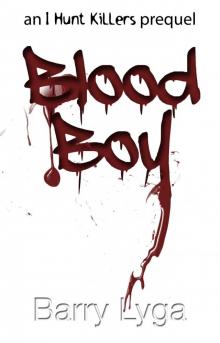 Blood Boy: an I Hunt Killers prequel
Blood Boy: an I Hunt Killers prequel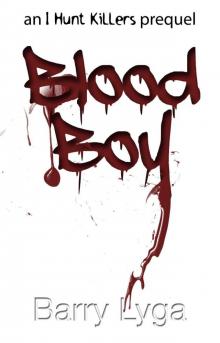 I Hunt Killers Blood Boy
I Hunt Killers Blood Boy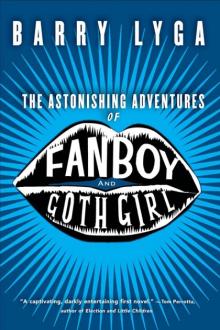 The Astonishing Adventures of Fan Boy and Goth Girl
The Astonishing Adventures of Fan Boy and Goth Girl